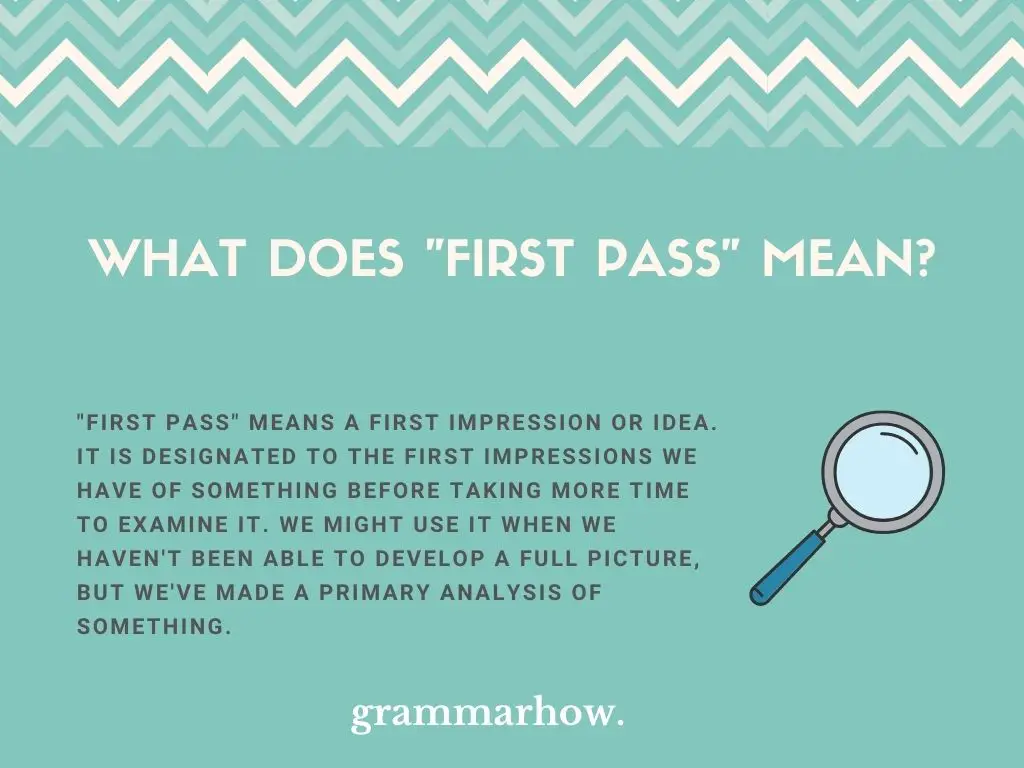You might have heard the term “first pass” before, but you might not know much about it. It’s fairly easy to work out, but you first need to know the contexts where it’s appropriate. Luckily, this article has all the information you could need to work it out.
What Does “First Pass” Mean?
“First pass” means a first impression or idea. It is designated to the first impressions we have of something before taking more time to examine it. We might use it when we haven’t been able to develop a full picture, but we’ve made a primary analysis of something.

The idea comes from going past something multiple times to try and understand more about it. Usually, we get more information from something the more times we analyze and look at it.
Naturally, the “first pass” won’t be the most useful “pass,” and we’ll want to develop more information with each subsequent “pass.”
However, in the context of using “first pass” in a sentence, it means we’re only going by first impressions. Sometimes, these impressions are wrong, or they don’t have the full picture, so when we say “first pass,” we’re asking for the reader to cut us some slack in case our impression is incorrect.
Examples Of How To Use “First Pass” In A Sentence
Now, let’s go over how to use “first pass” in a few sentences. Once you’ve seen a good number of these, you will be better equipped to use the phrase yourself!
- Take a first pass at the site and tell me what you think we can get out of it.
- I didn’t see much at the first pass, but I made sure to go back before I decided on anything drastic.
- It seems that, at a first pass, there isn’t much more that these people are willing to try.
- At a first pass, many of the natives decided against the referendum because of the issues, though I don’t know much more about it.
- Okay, it’s clear that I’m not his biggest fan, but that was only after the first pass!
- I took the first pass on the inspection site, but I didn’t find any of the things you drew attention to.
- The first pass of this area has been completed. They did not report any dangerous things or anomalies, so we are good to continue with work.
“First pass” works well when talking about a first impression. We use it when we don’t currently have all the information we might need, but we have a decent idea of what we might be able to expect from something after the initial time spent studying it.
Again, it’s more reliable to go for multiple passes since it will help us to build up a clearer image. However, this isn’t always possible, and sometimes plans need to be rushed, which is why a “first pass” might be more beneficial.
“First Pass” – Synonyms
You might benefit from learning a few synonyms for the phrase. We can use any of the following to show the same idea as a “first pass,” and some of these phrases are also a little more common in modern English.
- First impression
- First glance
- First look
- Early analysis
- On the face of it
All of these synonyms work well to show that we haven’t spent much time studying a thing. We only have the information we’ve figured out after one attempt, and we might need further information before we can make any clearer pictures.
Which Preposition Should I Use After “First Pass”?
You might have noticed in some of the examples in the previous sections that some prepositions are common with “first pass.” It would help to understand which ones work best.
The best prepositions with “first pass” are “at,” “on,” and “of.” We typically use “first pass at” as the most common preposition, where “at” refers to the thing that we’ve taken a first glance at to try and generate a decent impression.
Here are how all of the prepositional options might look:
- At: I took the first pass at the event as he told me to.
- On: We took the first pass on the crash site to help them out.
- Of: The first pass of the airplane was completed by my superior.
